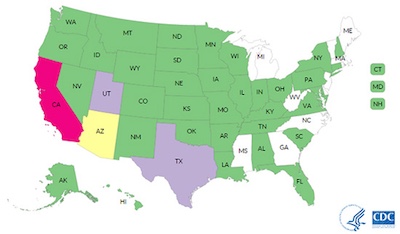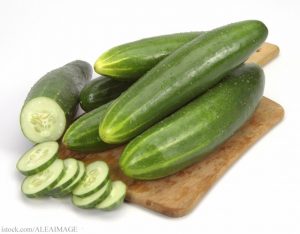It has been more than two months since the Centers for Disease Control and Prevention has updated the Salmonella Poona outbreak linked to imported cucumbers. Since that last update on November 19, 2015, 50 more ill persons have been reported from 16 states. And two more people in California have died, making the total number of deaths in this outbreak six, even though the Salmonella infection was not a “contributing factor” in those two deaths.

The number of illnesses has declined substantially since the peak in August and September, but the number of Salmonella illnesses reported every month should be about 1, not 25. Of the 38 ill persons recently sickened, 24 were interviewed. Twenty-four, or 63% of them, reported eating cucumbers the week before they got sick.
And since cucumbers do not have a long shelf life, and two recalls were issued, that means there may still be a problem somewhere in the chain from farm to plate. All epidemiologic, laboratory, and trackback investigations identified cucumbers imported from Mexico and distributed to Andrew & Williamson Fresh Produce as the likely source of this outbreak. Andrew & Williamson Fresh Produce issued a recall for slicer cucumbers on September 5, 2015; and Custom Produce Sales recalled Fat Boy Brand and unlabeled cucumbers on September 11, 2015. One hundred and six illnesses started after September 24, 2015, days after product was pulled from store shelves.
 So far, 888 people in 39 states have been reported infected with the outbreak strains of Salmonella Poona, and 191 ill persons have been hospitalized. Six deaths have been reported, from Arizona (1), California (1), Oklahoma (1), and Texas (1).
So far, 888 people in 39 states have been reported infected with the outbreak strains of Salmonella Poona, and 191 ill persons have been hospitalized. Six deaths have been reported, from Arizona (1), California (1), Oklahoma (1), and Texas (1).
The number of ill people reported from each state is as follows: Alabama (1), Alaska (19), Arizona (134), Arkansas (13), California (241), Colorado (21), Connecticut (1), Florida (1), Hawaii (1), Idaho (26), Illinois (11), Indiana (5), Iowa (7), Kansas (2), Kentucky (1), Louisiana (5), Maryland (1), Minnesota (43), Missouri (15), Montana (16), Nebraska (8), Nevada (17), New Hampshire (1), New Mexico (35), New York (6), North Dakota (8), Ohio (3), Oklahoma (13), Oregon (23), Pennsylvania (2), South Carolina (10), South Dakota (3), Tennessee (1), Texas (52), Utah (62), Virginia (1), Washington (26), Wisconsin (46), and Wyoming (7). Illness onset dates range from July 3, 2015 to January 6, 2016. Forty-nine percent of ill persons are children younger than 18.
Whole genome sequencing showed that the strains of Salmonella Poona from ill persons and from the contaminated cucumbers are closely genetically; related. And WGS of isolates from people who became sick in October and November are also closely related to the isolates from people who became ill during the outbreaks’ peak and to isolates from contaminated cucumbers. This evidence suggests that there is probably a common source of ongoing contamination.
No additional food items have been identified as a probable link to this outbreak. Investigators think that it may be cross-contamination within the distribution chain for the recalled cucumbers that caused the recent illnesses. In other words, a dirty truck, shipping containers, or pallets used to transport the original contaminated cucumbers could have contaminated cucumbers or other product.
There are not many ways to protect yourself against this outbreak if the problem is in the distribution chain, but there are some things you can do. Wash and sanitize drawers and shelves in your refrigerator often, especially where you store fresh produce. If you use reusable grocery bags, wash them often. And always avoid cross-contamination between raw meats, poultry, seafood, and eggs and foods that are eaten raw.
The symptoms of a Salmonella infection include nausea, vomiting, abdominal pain, diarrhea that may be bloody, fever, chills, headache, muscle pains, and blood in the stool. If you are experiencing these symptoms, see your doctor. A Salmonella infection can have long term complications, including reactive arthritis and high blood pressure, even if you recover completely. Your doctor should know about this illness and note it on your medical chart.




